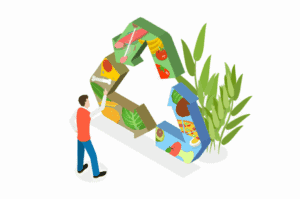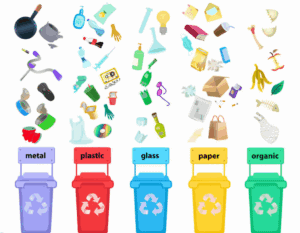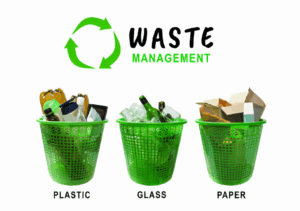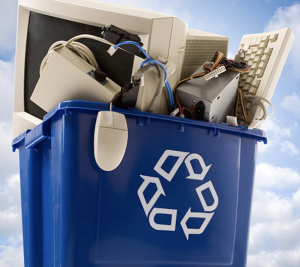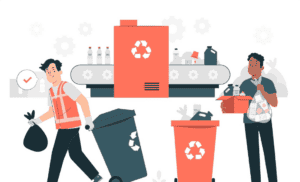Managing household waste in an eco-friendly manner is not just a trend but a vital necessity in our current environmental landscape. With growing awareness of environmental issues like pollution, climate change, and resource depletion, the importance of reducing our waste footprint has become more evident. An eco-friendly approach to waste management involves minimizing waste, reusing materials, recycling, and properly disposing of non-recyclable items.
This guide outlines practical and sustainable ways to manage household waste while helping you reduce your environmental impact.
-
Reduce Waste at the Source
The most effective way to manage household waste is to reduce the amount you generate in the first place. The principle of “reducing” encourages us to be mindful of what we consume and how we can avoid unnecessary waste.
- Mindful Consumption: Before purchasing new products, ask yourself if you need them or if you can find an alternative. Avoid impulse buying and invest in quality, long-lasting items instead of cheap, disposable ones.
- Bulk Shopping: Buy in bulk to reduce packaging waste. Many products come in excessive plastic wrapping, so buying larger quantities at once minimizes the packaging waste you bring home.
- Avoid Single-Use Plastics: Single-use plastics, such as water bottles, straws, and plastic bags, contribute significantly to pollution. Replace them with reusable alternatives like stainless steel water bottles, cloth bags, and metal straws.
- Reduce Food Waste: Plan meals, make shopping lists, and store food properly to avoid spoilage. Compost organic waste like fruit and vegetable scraps (more on composting below).
Visit:
-
Reuse and Repurpose Items
Reusing is another key pillar of eco-friendly waste management. Many items that you might discard can have a second life with a bit of creativity.
- Repurpose Containers: Glass jars, plastic containers, and bottles can be reused to store food, organize small household items, or for DIY projects.
- Donate and Sell: Instead of throwing away old clothes, electronics, or furniture, donate them to local charities or sell them online. What might no longer be of use to you could be valuable to someone else.
- Upcycling: Upcycling involves transforming waste materials into new products of higher value. For example, you could turn an old ladder into a bookshelf or transform wooden pallets into furniture.
- Reuse Paper: Use both sides of paper before recycling it. Old newspapers can also be used for cleaning windows, wrapping fragile items, or as compost material.
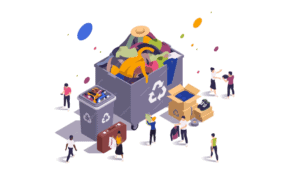
-
Recycle Responsibly
Recycling is one of the most well-known eco-friendly waste management practices, but it must be done properly to be effective. Recycling helps reduce the demand for raw materials and minimizes landfill waste.
- Sort Your Waste: Separate recyclables (such as paper, cardboard, glass, and metal) from general waste. Many municipalities offer recycling collection services, so check what materials are accepted in your area.
- Clean Your Recyclables: Ensure that recyclables are clean and free from food residue. Dirty containers can contaminate an entire batch of recyclables, sending them to landfill.
- Know What to Recycle: Not everything is recyclable. Common non-recyclable items include plastic bags, Styrofoam, greasy pizza boxes, and certain mixed-material products. Avoid placing these in recycling bins unless your local facility accepts them.
- E-Waste Recycling: Electronics contain valuable metals but can also leak harmful chemicals if improperly disposed of. Take old electronics to designated e-waste recycling centers to ensure they are safely processed.
-
Compost Organic Waste
Composting is a highly effective way to manage organic waste while enriching your garden soil. Rather than sending food scraps and yard waste to a landfill, where they decompose and produce harmful methane gas, you can turn them into nutrient-rich compost.
- What to Compost: Fruit and vegetable scraps, coffee grounds, eggshells, grass clippings, and leaves are all compostable. Avoid composting meat, dairy products, and oily foods, as they can attract pests and take longer to break down.
- How to Compost: You can compost in your backyard using a compost bin or pile, or you can use an indoor composting system if you don’t have outdoor space. Turn the compost regularly to allow airflow and promote decomposition.
- Benefits of Composting: Composting not only reduces waste but also improves soil health. It adds valuable nutrients to the soil, helps retain moisture, and reduces the need for chemical fertilizers.
-
Properly Dispose of Hazardous Waste
Certain items in your home cannot be recycled or composted due to their hazardous nature, and they require special handling to avoid environmental contamination.
- Batteries: Batteries contain harmful chemicals like lead, cadmium, and mercury. Many stores and recycling centers offer battery recycling programs, so don’t throw them in your regular trash.
- Household Cleaners and Paint: Leftover cleaning supplies, paint, and other chemicals should be taken to a hazardous waste disposal site.
- Light Bulbs and Electronics: CFL bulbs, fluorescent tubes, and certain electronics contain mercury and should be recycled at specialized facilities.
- Medicines: Unused or expired medications should never be flushed down the toilet or thrown in the trash. Many pharmacies offer take-back programs to ensure they are safely disposed of.
-
Choose Eco-Friendly Products
The products you choose for your home can significantly impact the amount of waste you generate. Opt for products made from sustainable materials that can be recycled or composted after use.
- Biodegradable Products: Choose biodegradable options for household items like cleaning supplies, personal care products, and disposable tableware.
- Reusable Items: Invest in reusable cloth napkins, kitchen towels, and shopping bags to replace disposable paper products.
- Eco-Friendly Packaging: Support companies that use minimal or eco-friendly packaging, such as recycled cardboard or plant-based plastics.
-
Educate and Encourage Others
Eco-friendly waste management practices can have an even greater impact when shared with others. Whether it’s within your household, at work, or in your community, encourage others to adopt sustainable habits.
Get Family Involved: Teach your children or housemates about the importance of reducing waste, reusing items, and recycling with the help of ewaste in Bangalore. Make it a family effort to minimize your household’s environmental footprint.
- Join Local Initiatives: Many communities have green initiatives, such as neighborhood clean-up events or recycling awareness programs. Participating in these can help you make a broader impact.
- Share Knowledge: Share tips and resources on social media or with friends and family. By raising awareness, you contribute to a larger movement toward sustainable living.
In Conclusion
Eco-friendly household waste management is about making small, conscious choices that add up to significant environmental benefits. By reducing waste at the source, reusing materials, recycling properly, composting, and disposing of hazardous waste responsibly, you can contribute to a cleaner, greener planet.
Incorporating these habits into your daily routine not only helps the environment but can also save you money and create a more sustainable, healthy home.


